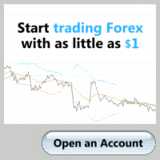Oftentimes, if you trade currency on the foreign exchange, you'll have quite a few advantages over trading stocks. You'll have:
24-hour market
The foreign exchange is open for business 24 hours a day, seven days a week. This is a big advantage for small investors who are just starting out and trading in their spare time. You don't have to juggle your schedule to make time for trading opportunities. Rather, you can trade whenever it's convenient for you, including at one o'clock in the morning if you choose.
Low transaction costs
Rather than being paid traditional commission-based fees, forex brokers don't charge hidden fees as a rule. Instead, the broker's fee is included in the trade within the bid/ask spread. (The spread is the difference between what you buy a currency for and what you sell it for, with the spread expressed in "pips.")
Leverage and margin
Because forex traders can trade on margin, they can have significant leverage in their trading. They can make extraordinary profits with reasonably small investments. For example, if your broker allows you a margin of 100:1, you can purchase $100,000 in currency with just a $1000 deposit. Of course, you have to use leverage carefully because it can hurt as well as help you, and you can incur large losses as well as large profits.
High liquidity and fast trade execution
When you trade in currencies, you trade in cash. Because no investment is more liquid than cash, trades are executed almost instantaneously. You don't sit around and wait for your trade to execute.
Not easily influenced
Because the foreign exchange market is so large, no individual, fund or bank, or government entity, for that matter, will influence it for very long. This is in opposition to the stock market, where one negative appraisal by an analyst could significantly hurt investors.
Relatively small sample to keep track of
With forex trading, you only have seven major currencies to follow, rather than thousands of stocks and companies as with traditional stock market trading. Therefore, you can focus a lot on just those currencies you trade in. Many successful traders don\'t even trade in all seven but focus on three or four. In this way, you can narrow their focus even further. If done right, this can increase your success markedly.
No bear or bull markets
Because you can trade short or long in forex trading, you can make money regardless of whether prices go up or down, as long as you guess correctly. Because of this, you have more control than you do in the stock market, where the market has a \"mind of its own\" in a lot of cases.
24-hour market
The foreign exchange is open for business 24 hours a day, seven days a week. This is a big advantage for small investors who are just starting out and trading in their spare time. You don't have to juggle your schedule to make time for trading opportunities. Rather, you can trade whenever it's convenient for you, including at one o'clock in the morning if you choose.
Low transaction costs
Rather than being paid traditional commission-based fees, forex brokers don't charge hidden fees as a rule. Instead, the broker's fee is included in the trade within the bid/ask spread. (The spread is the difference between what you buy a currency for and what you sell it for, with the spread expressed in "pips.")
Leverage and margin
Because forex traders can trade on margin, they can have significant leverage in their trading. They can make extraordinary profits with reasonably small investments. For example, if your broker allows you a margin of 100:1, you can purchase $100,000 in currency with just a $1000 deposit. Of course, you have to use leverage carefully because it can hurt as well as help you, and you can incur large losses as well as large profits.
High liquidity and fast trade execution
When you trade in currencies, you trade in cash. Because no investment is more liquid than cash, trades are executed almost instantaneously. You don't sit around and wait for your trade to execute.
Not easily influenced
Because the foreign exchange market is so large, no individual, fund or bank, or government entity, for that matter, will influence it for very long. This is in opposition to the stock market, where one negative appraisal by an analyst could significantly hurt investors.
Relatively small sample to keep track of
With forex trading, you only have seven major currencies to follow, rather than thousands of stocks and companies as with traditional stock market trading. Therefore, you can focus a lot on just those currencies you trade in. Many successful traders don\'t even trade in all seven but focus on three or four. In this way, you can narrow their focus even further. If done right, this can increase your success markedly.
No bear or bull markets
Because you can trade short or long in forex trading, you can make money regardless of whether prices go up or down, as long as you guess correctly. Because of this, you have more control than you do in the stock market, where the market has a \"mind of its own\" in a lot of cases.


